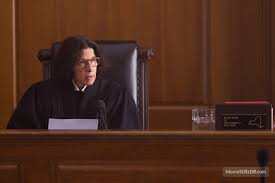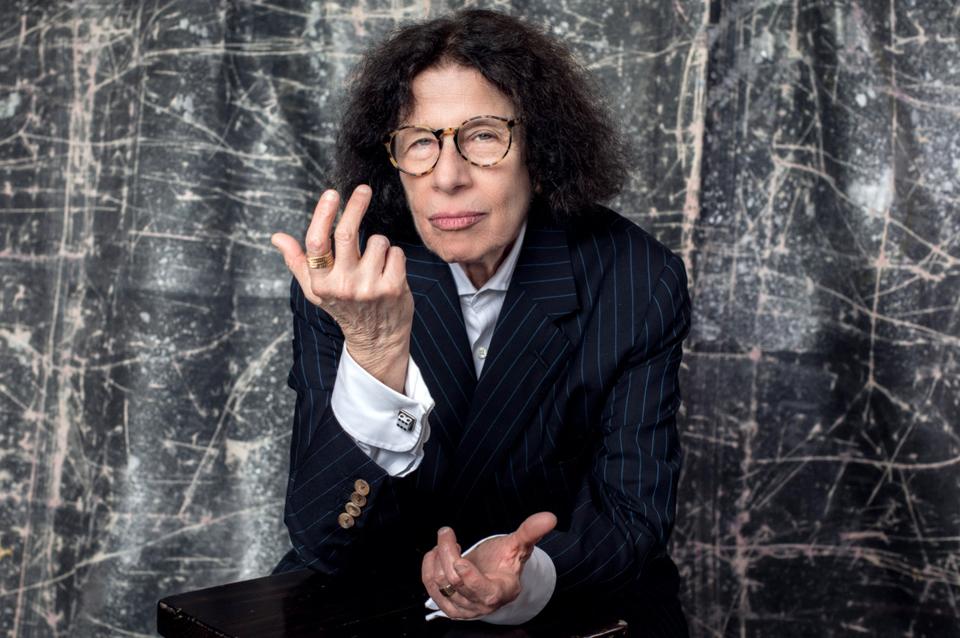What is it about a curmudgeon? …asked a curmudgeon. Or so have I occasionally been obliquely described. ‘Curmudgeonly’, rather than an actual ‘curmudgeon’. So far….
I thought about this inexact and usually quite inaccurate categorization intermittently last Saturday at Fran Lebowitz’s speaking engagement at The Broad Stage in Santa Monica. Let me be clear that I do not think of Fran Lebowitz as a curmudgeon, although her attitudes and opinions on certain subjects might occasionally be characterized as curmudgeonly. There is a good explanation for this characterization, but the foundation for it can be summed up simply as an early exposure to humanity. There is a flip side to this but it’s not ordinarily encountered straightaway, and is usually offset by confirmation of those early disillusionments — which is inherently dismaying.
You can’t ‘pretend it’s a city’ without a certain density of humanity. Setting aside my childhood experiences of New York (and New Jersey I might add), I have personal knowledge of this because for many years the Los Angeles I had known before university never really felt like a real city to me and for that reason I felt no hurry to return to it without some specific work-related reason to do so.
At a certain point, that multiplicity of L.A.’s—the floating ‘nowhere’ city, its media and industrial hubs and its innumerable undergrounds and spiraling suburbs began morphing and melting into something that, however centrifugally unwieldy, you could ‘pretend it was a city’. I quickly became aware of another aspect to this slightly more urbane urban space: there were a lot more people (and vehicles!) here. It takes a lot of people just to make a city successfully ‘pretend it’s a city’.
And a certain number of those people are inherently irritating. They shape their own roles (that’s okay) and they make their own rules (that’s not always okay). They impose guidelines, when what they need is guidance—from you, from anyone really other than themselves. With luck they’ve been educated, but they haven’t necessarily absorbed or integrated much of it into their persons. They’re still processing, and a million silicon chips and ingenious algorithms aren’t necessarily going to speed it up much. They’re socializing—after a fashion; but the notion of a society (great or not so much) forever eludes them. Speaking of society and socializing, have you ever seen Hitchcock’s The Birds? (I’m asking you, Gen Z-ettes, et seq.) Tippi Hedren’s Melanie isn’t necessarily to blame for that little mass-migration detour; and Suzanne Pleshette’s Annie deserved better than that horrifying (off-camera for chrissakes!) exit—but please don’t blame it on the birds. The ornithologist was right after all. Humans, generally speaking, are an irritating lot.
There’s nothing petulant or self-indulgent about Fran’s irritability, nor is she entirely without sympathy or compassion for the humans who over-populate the urban environment she regards otherwise as her habitat of choice. (Just keep moving for fuck’s sake and have a bit of respect for the place and the people who love it.) She’s irritated by the same things that irritate the rest of us: unreasonable or unrealistic expectations, false or unfounded assumptions, fatuous pretensions, unchecked predations, civic and political corruption, chronic incompetence. Nor is she unaware of her own capacity to occasionally indulge the discreet social aggression or skewed assumption or presumption for slightly malicious comic effect. She is making a point goddamnit and don’t make her raise her voice to put it across. Inconvenience and interruption (as long as it’s not from an audience member) amuse her as much or more than they irritate, as they expose her own inescapable limitations and susceptibility to the same things that make other humans such easy objects of ridicule.
In other words, she knows how to value and make use of those irritants. She also understands a thing or two about anger and how a little anger can go a long way. Political? Sure. But please don’t press her on her participation in this campaign or that demo. I mean—what have you got to show for it? That’s not what she came to New York for. And besides she’s in the middle of reading something. Or re-reading something. Ask her something about that. But wait—there are six or seven books on her nightstand right now, so maybe just piss off.
Basically you have it right there. The flip side of that disillusionment? That irritability? Curiosity. Talk to me. Tell me something new. Show me what you’ve got. Go ahead and put some spin on it—I’ve got my own racquet here. So we’ve got a bit of a rally going here—good for a giggle. Go ahead—run for the net. You will not be spared my cross-court winner. Never a girl to ‘look for herself in books’, as she reminded the Broad audience, Fran was looking for a world outside Morristown (and what we might call the suburban ‘Levittown U.S.A. generally). Over the river and cross the bridge, she managed to land in the right place.
She talked a bit Saturday afternoon (with Sandra Tsing Loh, whose Loh Down on Science is a passion and addiction of mine) about her relative non-involvement in any gay rights causes. But get real: she had plunked herself down in the middle of a royal court of intellectual jesters who not only clearly called out the ‘love-that-dared-not-speak-its-name’, but wrote symphonic variations and ballets around every form it took. Especially ballets. (I mean it’s not like Les Ballets Trockadero de Monte Carlo came out of nowhere. These were (and are) gifted dancers in drag who understood their Petipa and Balanchine as well as Baryshnikov and Suzanne Farrell.) Of course they took every kind of drug and had every kind of sex: they were in New York. This was not the first time Fran mentioned that as tragic as the premature loss of so many important artists and intellectuals (e.g., Mapplethorpe, Haring, Wojnarowicz, Nomi, Jacobs, etc.) to AIDS was, no less tragic was the loss of a “generation of discerning audiences” for, among other things, serious contemporary dance and the classical ballet.
Clearly in the decade or two that followed her arrival in New York, she was acutely conscious of the political mainstream neglect and inaction on AIDS research—which makes me think of Larry Kramer, ACT-UP, AmFAR and political and medical allies—in other words all of the anger, agitation and serious activism that finally pushed medical research, government investment, and public education in what might be considered a precursor to the current pandemic.
Fran has often claimed that a seat on the Supreme Court—not the New York Supreme Court (equivalent to California’s Superior Court) she is occasionally seated on in the NBC television series, Law and Order, but the actual U.S. Supreme Court—would be an ideal job for her. And there are moments when it actually doesn’t seem like much of a stretch. The last couple days have been one such moment.
 She is consistently pitch-perfect as Judge Janice Goldberg because she understands what judges are called upon to do and what kind of people they are—in other words, people who understand the law and the procedural mechanics, and are very good at their jobs, but also humans with moods, appetites, biases, expectations. So I’ve thought about this over the last couple of days since Justice Alito’s horrific draft opinion in Dobbs, et al. v. Jackson Women’s Health Organization, et al. (a few choice sections of which seem almost strident—not in their ideological bias, but their sheer historical ignorance).
She is consistently pitch-perfect as Judge Janice Goldberg because she understands what judges are called upon to do and what kind of people they are—in other words, people who understand the law and the procedural mechanics, and are very good at their jobs, but also humans with moods, appetites, biases, expectations. So I’ve thought about this over the last couple of days since Justice Alito’s horrific draft opinion in Dobbs, et al. v. Jackson Women’s Health Organization, et al. (a few choice sections of which seem almost strident—not in their ideological bias, but their sheer historical ignorance).
I can’t really say that Fran would have an easy time clearing the ABA’s judicial review standards for the highest court; that said, it’s not as if they were exactly thrilled with Trump appointee Kathryn Kimball Mizelle’s nomination (determined to be not qualified) to the federal bench, yet there she is. Opinion is divided as to whether two (or more) additional seats should be added to the Supreme Court. But maybe what they need is something else altogether. Maybe they need a specific check and safety valve on that essential, yet inestimable and almost unquantifiable value of the Court: its legitimacy in every sector of the American society and its cultural and political fabric. Maybe they need an ombudsperson—and wouldn’t Lebowitz be just about perfect in the role? Someone who could set aside the legal theory and arguments for a slightly more basic reality check. (Also history, science, culture, and psychology check—the Dobbs opinion in its present form could use one in all of these categories.) Also regardless of her specific legal knowledge, I just have an odd hunch Fran might be right on Justices Elena Kagan’s and Sonia Sotomayor’s wavelength. Don’t worry about their judicial/ideological biases. It’s not like she doesn’t have her own. But somehow she gets past them to an often uncannily informed and insightful judgment. I’m thinking back to a moment from the Scorcese documentary, Public Speaking, where her close friend, Toni Morrison comments how she is always struck by how often Lebowitz is absolutely correct in her judgments or conclusions, yet not always “fair.” Events move on hard decisions. Judgments have consequences. (Is it even conceivable that the Chief Justice wouldn’t have said something to the Justices and Clerks along the lines of, ‘hey—you might want to think that through one more time?’) The Chief, eight associates, and one Fran Lebowitz with a word or two of her own about those scary decisions. The Supreme Court doesn’t need security fencing around it (there’s one going up as I write this). It just needs a safety valve. Fran.
So what exactly is a curmudgeon? I think of George Booth‘s New Yorker cartoons when I think of the classic curmudgeon. But it’s not even necessarily the cranky old geezer under the bare lightbulb who exemplifies the role. Just as often it’s the itchy, scratching, growling dog, ready to scratch through the bare floor or tear through the apartment and send everything in sight flying. And it doesn’t really take much. Forget grown men dressing as if they were still six years-old and women forever trudging to non-existent yoga classes in Lululemon togs. Consider the evangelical Christian broadside that greeted Lebowitz on the stop that preceded her flight to the west coast. “Hell Is Real” proclaimed the billboard. Not that she needed to be told—she had just gotten off a commercial flight. No more than a minute or so later, she had yet another confirmation: “Welcome to Indianapolis.” The dogs bark, as they say, and the caravan moves on.
Back in the dessicated people’s paradise of Santa Monica, Fran left the aspiring pundits, art stars, venture capitalists and software or algorithm designers in the Broad’s audience (also more than a few boomers and Gen-X’ers) with one bit of career advice: make your software softer, in fact make it liquid: look for water. The way things are going, the next mass migration may look like a dust bowl tsunami.


